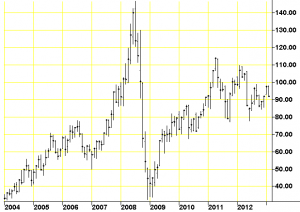Are the USA dragging Europe into the divisive world of creditors and debtors, and looking for a new “cold war”? This is the summary of the latest Global Europe Anticipation Bulletin n° 84 dealing with such hypothesis. Read more here (Italian) and here (French).
Category: Markets
Mar 27
Bank of England undermines the Classic Money Creation Theory
“In exceptional circumstances, when interest rates are at their effective lower bound, money creation and spending in the economy may still be too low to be consistent with the central bank’s monetary policy objectives. One possible response is to undertake a series of asset purchases, or ‘quantitative easing’ (QE)… As a by-product of QE, new …
Oct 22
The birth of the ‘de-Americanized’ world
China has had enough. The Country of Great Wall is working at a “de-Americanized” world. A commentary of Xinhua, a State controlled press agency, explains how and why and launches the idea of Petroyuan. “With its seemingly unrivaled economic and military might, the United States has declared that it has vital national interests to protect …
Jul 01
Rogue States
The so called “Datagate”, recently boosted by a Glenn Greenwald’s investigation published by the Guardian, early June, unveils an uncomfortable truth on the UK-USA espionage over world’s communications, and in particular over ‘allied’ European Countries. Since the first allegations moved to USA Embassy in Bruxelles over phone tapping, computer hacking and bugs at the European Commision’s …
Jun 23
Self-fulfilling prophecies
Italy seizing up in a Mediobanca Security report to its customers, uncovered by ilfattoquotidiano.it. Mediobanca Securities report from ilfattoquotidiano The Country is also in the “blacklist” of European peripheral States —Greece, Spain, Portugal and Italy— where Constitutions with “a strong socialist influence” might put them at the center of the debt crisis, a J. …
Mar 13
Deficit cuts and the obious link with recession
It is a debated issue in these times, that of deficit cuts, along with the less famous theme of the “end of growth” and that of the finite nature of resources on hearth. In his Museletter 249, Richard Heinberg connects them in a summary of thoughts which may turn useful to those aiming to understand why …
Mar 11

